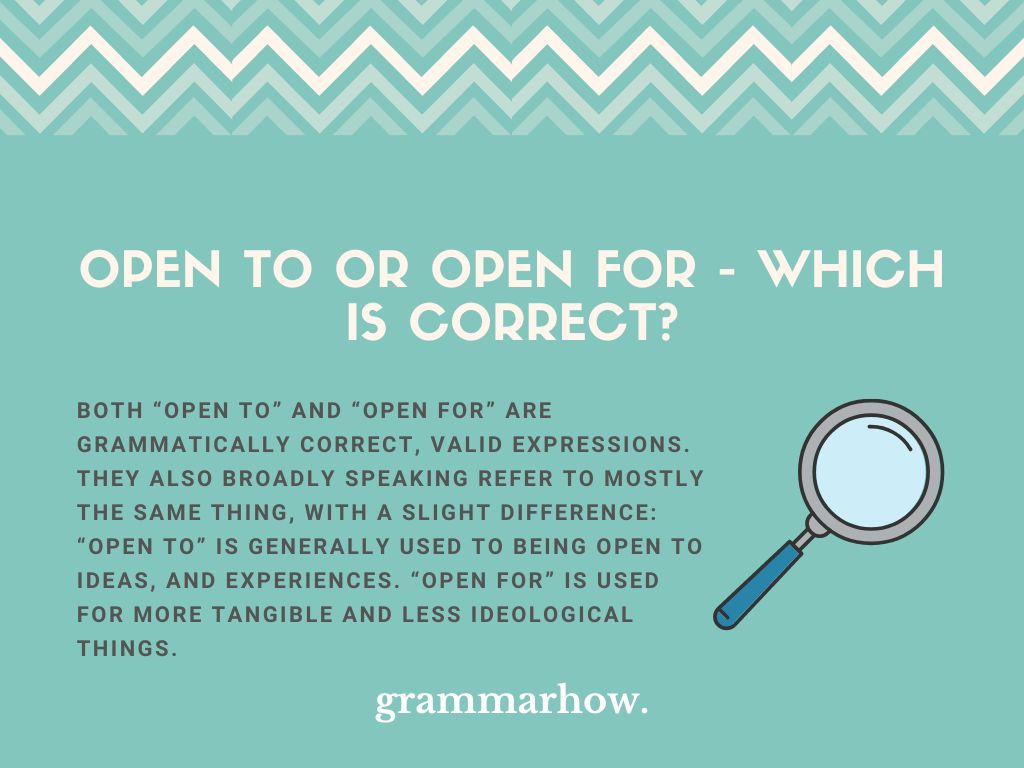When it comes to using the word “open”, should you use “open to”? Or do you use “open for” instead? Is one of these correct and one of these incorrect? Or do they just mean different things? This article is going to answer all of these different questions.
Open To or Open For – Which Is Correct?
Both “open to” and “open for” are grammatically correct, valid expressions. They also broadly speaking refer to mostly the same thing, with a slight difference: “Open to” is generally used to being open to ideas, and experiences. “Open for” is used for more tangible and less ideological things.

Therefore, these are expressions that can certainly be interchangeable or synonyms, in the right context. However, broadly speaking, people will use them to refer to slightly different things.
Therefore, people will often use “open to” when talking about how they are open to a specific idea, ideology, experience or life situation.
Meanwhile, they will use “open for” in terms of less ideological things, such as the expressions “open for business” or “open for commissions”, they are expressions that feel more grounded in an economic reality.
Open To
“Open to” is an expression, more specifically an idiom, used to talk about the fact that you’re willing to consider a specific idea, stance, or anything in particular that a person could feasibly consider or be willing to consider. It’s a very common and understandable expression.
When someone is “open to” something, it means that while they might not be fully convinced by the thing in question, they are nonetheless willing to consider it in spite of their insecurity.
Here are a few example sentences that highlight the different ways in which you can use “open to”:
- I am open to opportunities, and I’ll basically take any opportunity that appears in my path.
- She’s open to new opportunities as far as I know, you should shoot her an email just in case.
- This place is open to all, no matter your gender, race, or sexuality, you may buy our fries.
- I’m open to suggestions, just let me know what you think about the work first and foremost.
- He’s open to discussion, and actually welcomes his students challenging him on his ideas.
- That ride is open to everyone because it’s not very extreme at all, but rather welcoming instead.
- She’s open to questions so you should ask her about her latest book and the research inside of it.
Open For
“Open for” is an expression that is used to express the fact that you’re ready to do something, whether it’s have a conversation, or a business deal, and it’s an expression that can be thought of as a way to express availability before anything else.
Using “open for” is a good way to convey the idea that you’re willing and available for something, whether it’s a project or a conversation, it’s a very widely-used phrase that can be very adaptable.
These example sentences will teach you the correct way to use “open for” in different sentences:
- I’m open for negotiation this upcoming fall season, so be ready for that.
- She’s going to be open for public queries and interviews very soon if you’ll wait a little bit.
- I’m open for questions, you just have to run them by my agent first to get them approved.
- It’s open for interpretation, and I personally really like the fact that it’s ambiguous.
- My new home is open for everyone, if you’re a friend, and you can stop by anytime.
- I’m open for suggestions but I will have you know that I’m fairly certain of my stance.
- This job offer is open for all possible applicants as long as you meet the criteria.
Which Is Used the Most?
According to information compiled by the Google Ngram Viewer, “open to” is significantly more popular than “open for”, and has been since at least the year 1900. There has been no point in which “open for” was more popular since 1900.

“Open for” has not even come close to surpassing “open to” in popularity in all of the time that has passed since 1900.
Final Thoughts
Both “open to” and “open for” are very valuable and grammatically correct expressions that are worth learning about. While “open to” is used for ideological things and “open for” is somewhat more general, they’re also interchangeable with each other in spite of this small distinction.

Martin holds a Master’s degree in Finance and International Business. He has six years of experience in professional communication with clients, executives, and colleagues. Furthermore, he has teaching experience from Aarhus University. Martin has been featured as an expert in communication and teaching on Forbes and Shopify. Read more about Martin here.
